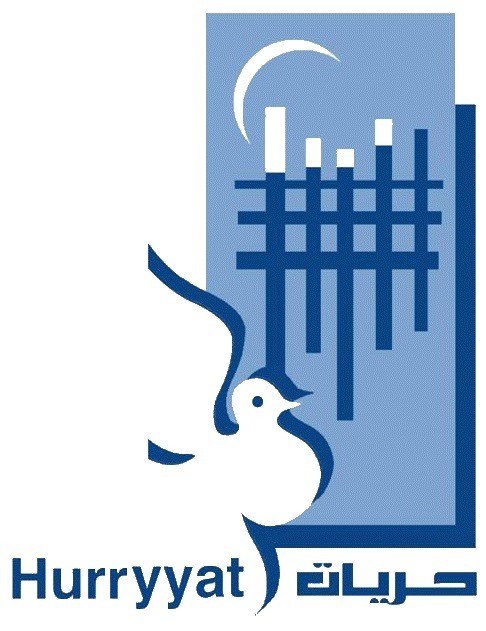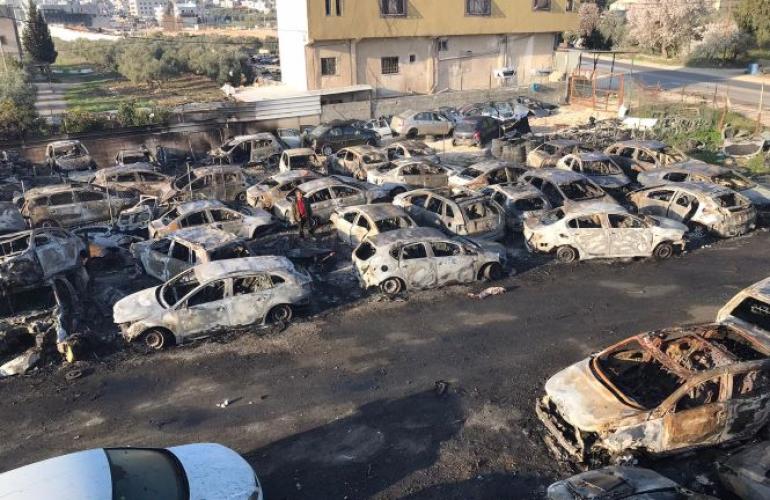Closure of Huwara
By Rafaël Rutten, April 11, 2023.
Amidst continued escalation of violence against Palestinians in the Occupied Palestinian Territory (oPt), the West Bank village of Huwara has become an epicentre of attacks on Palestinian civilians by Israeli settlers and military personnel. Part of the occupying power’s systematic violence and sparked by attacks on Israeli settlers, violent incidents have become frequent, most notably in the devastating rampage of Israeli settlers resulting in the death of one Palestinian man, hundreds of injuries and dozens of burned cars and houses. The attack was carried out in the presence of Israeli soldiers, who stood idly by and even protected the settlers during their hours-long destruction of the town.[i] This was no spontaneous attack, but an organized effort following a period of increasingly hateful rhetoric by far-right Israeli figures. Continuing in the rampage’s wake, the Israeli Minister of Finance Bezalel Smotrich stated Huwara “needs to be wiped out” and other prominent politicians called for increased control over Huwara and the movement of its citizens.[ii] Now, a month after the ravaging in Huwara, entrances to the village have increasingly been obstructed by newly erected checkpoints, barriers and other physical obstructions. This development is part of a larger trend of closure, separation and fragmentation deeply ingrained in Israel’s policy in the oPt.
Huwara, just south of Nablus, has a long history of settler violence against Palestinians, as Israelis pass through the town frequently to access nearby settlements. These colonies, illegal under international law, are mostly connected by an intricate web of segregated bypass roads designed to facilitate easy travel between them and Israel, adding to the complex territorial patchwork of control and separation that the West Bank has become.[iii] The village is also in close proximity to the city of Nablus, which has long been a bastion of Palestinian resistance against the Israeli occupation. Over the last months, the city has been the site of multiple violent raids by the Israeli military and has seen a growing influence of a Palestinian armed group called the Lion’s Den, which is dedicated to resistance against the occupation and the defence of Nablus.[iv] This adds to the tensions in Huwara, as it serves as an important thoroughfare connecting Nablus to cities further south, such as Ramallah, Jerusalem and Bethlehem. Thus, the frequent contact of settlers and Palestinians and its strategic importance, make Huwara simultaneously unique as well as exemplary for the discriminatory policies and systematic violence in the oPt.
In an attempt to reinforce Israeli control over the occupied space in Huwara, the movement of Palestinians is limited through the use of physical obstacles placed at the entrances of the village. By erecting military checkpoints, barriers, gates and earth mounds, the Israeli occupiers effectively close off the town and restrict free movement of Palestinian citizens. Contrarily, settlers are free to move through the town, unencumbered by military searches and traffic jams. This selective closure, deemed a form of collective punishment under international law, is a fundamental tool in the arsenal of the Israeli occupation. Especially after attacks on Israeli soldiers or settlers, whole towns are effectively sealed off, using temporary as well as permanent measures. Under the pretence of a preventive security procedure, it is widely used to demonstrate Israeli power, bolster an unequal status quo between the two populations, foster a climate of uncertainty and fragment Palestinian society. The figurative flexing of military muscle serves as a constant reminder of the power imbalance in the oPt, continuously subjugating Palestinian citizens to intrusive and dehumanising measures of control over their movement, livelihood and freedom. Moreover, the ease with which settlers traverse the same space illustrates the stark contrast between the two populations of the oPt. The segregated areas the respective civilians can access, the imbalance in human rights they possess and the disproportionate freedoms they enjoy, all cement the inherent discriminatory disparity between Israeli settlers and Palestinians living under occupation. Furthermore, the seemingly random and unexpected nature of physical closure disrupts daily life and routines. A commute to work or a trip to family may suddenly take four times as long or be prohibited all together. Effectively increasing spatial and temporal distance and sowing uncertainty and unpredictability, this conduct can be described as ‘calibrated chaos’.[v] Finally, closure aims to separate Palestinian spaces, creating enclaves divided by Israeli control, resulting in a fragmented Palestinian archipelago. Separation and fragmentation shape all aspects of Palestinian life. Individually, it hinders or completely prevents visiting family, finding work or seeking adequate medical care. Collectively, it restricts the formation and preservation of national identity, Palestinian culture and political state-building.
Physical closure of contested spaces is only one way in which the mobility of Palestinians is continuously restricted. The Israeli occupation employs a multitude of tools aimed to immobilise the Palestinian population, ranging from physical barriers such as fences, gates and the separation wall, to administrative measures like identity cards and permits, to monitoring devices such as checkpoints and surveillance technology. This crippling apparatus directly violates the Human Right to Freedom of Movement, as outlined in Article 13 of the Universal Declaration of Human Rights, which dictates that:
- Everyone has the right to freedom of movement and residence within the borders of each state.
- Everyone has the right to leave any country, including his own, and to return to his country.
Israel controls the movement of Palestinians within the borders of the oPt, prevents Palestinians from leaving the oPt and denies Palestinians the right to return to their own country, thus violating a universal human right. Furthermore, the Right to Freedom of Movement is a fundamental platform right, which has far-reaching implications for a plethora of other rights, including the right to self-determination, the right to health, the right to work and the right to family life. Therefore, Israel continuously violates a wide array of universal human rights in flagrant defiance of international law.
Hurryyat calls on the international community to take an active stance in order to stop the constant violations of universal human rights committed by Israel’s occupation regime. Concretely, Hurryyat proposes the following steps:
- Ensure international protection for Palestinian civilians in accordance with United Nations Security Council (UNSC) Resolution 904 Articles 2 and 3. This requires the implementation of measures with the aim of preventing illegal acts of violence by Israeli settlers, including the confiscation of arms and measures to guarantee the safety and protection of Palestinian civilians, including a temporary international presence.[vi]
- Hold Israeli settlers accountable for crimes of war under International Humanitarian Law and the Geneva Conventions. Israeli military and Israeli government institutions should cease protecting settlers and perpetrators of crimes of war should be tried in accordance with International Law, as outlined in UNSC Resolution 2334 (specifically Article 6).[vii]
- Hold settlers with dual citizenship accountable for their involvement in illegal occupation and crimes of war by stripping their citizenship. Many settlers hold both an Israeli passport and a European or American passport, which grants them the luxury position of being free to move back to their home countries in case they face trouble in their illegal settlements in Israel.[viii] This leads to many perpetrators of settler violence to leave Israel after committing illegal violent acts and thus escaping justice. Western governments thus hold a considerable power over a portion of the settler population, by stripping perpetrators of their citizenship. Governments should utilise this tool to hold perpetrators accountable for their violent actions.
- Educate and engage in the Palestinian cause. Students specifically, being the future of our society, should actively inform themselves through reading, listening and most importantly, visiting. Independently visiting the oPt is the only way to truly grasp the reality of life under occupation and the obstacles Palestinians face in their daily lives. Understanding the systematic atrocities committed by the Israeli occupation and subsequently working to stop these practices, whether through pressuring governments, engaging in activism or humanitarian work or making meaningful change on a policy level, is incredibly useful. Awareness of the plight of the Palestinian people and active engagement in the Palestinian cause, can help shape the future of the oPt.
The Center for Defense of Liberties and Civil Rights “Hurryyat”, through its Right to Movement and Travel Project, works to aid Palestinians who have been banned from travel, research the ways in which the Right to Movement is violated and advise international bodies on the subject. For more information on its mission and activities, as well as other important projects, please take a look at our website.
For more information:
- On Huwara:
- ‘Israel besieges Nablus, MK calls for Huwara to be ‘tightly closed’,’ Middle East Monitor, March 27, 2023. https://www.middleeastmonitor.com/20230327-israel-besieges-nablus-mk-calls-for-huwara-to-be-tightly-closed/
- ‘Israel closes Palestinian stores in Huwara,’ Middle East Monitor, March 20, 2023. https://www.middleeastmonitor.com/20230320-israel-closes-palestinian-stores-in-huwara/
- ‘Palestine’s Huwara should be wiped out: Top Israeli minister,’ Al Jazeera, March 1, 2023. https://www.aljazeera.com/news/2023/3/1/israel-arrests-settlers-after-anti-palestinian-pogrom
- Fatima AbdulKarim, ‘“A Closed, Burnt Huwara”: How Israeli Settlers Launched A Pogrom,’ The Nation, March 16, 2023. https://www.thenation.com/article/world/palestine-israel-huwara-pogrom/
- Rula Salameh, “I Witnessed a Shocking Attack on Palestinian Civilians. What I Saw May Be a Sign of What’s to Come,’ TIME, March 18, 2023. https://time.com/6264116/west-bank-attack-palestinian-civilians/
- On Movement and Mobility:
- B’tselem: provides information, updates and an interactive map illustrating restrictions of movement. https://www.btselem.org/topic/freedom_of_movement
- Julie Peteet, ‘Space and Mobility in Palestine.’ Bloomington, Indiana University Press, 2017.
- Nadia Abu-Zahra and Adah Kay, ‘Unfree in Palestine: Registration, Documentation and Movement Restriction.’ London, Pluto Press, 2012.
- United Nations Human Rights Council, ‘Freedom of Movement Human rights situation in the Occupied Palestinian Territory, including East Jerusalem.’ (A/HRC/31/44), January 20, 2016.
Rafaël Rutten is a Dutch intern working with Hurryyat on the Right to Movement and Travel Project, based in Ramallah. He has a Bachelor’s Degree in History & International Relations and is currently following a Master’s program in Conflict Studies & Human Rights, both at Utrecht University. He has a broad interest in history, international relations, violent conflict and media, with a regional focus on the Middle East and North Africa, specifically the Israel-Palestine Conflict.
[i] Oren Ziv, “Huwara reels after night of settler terror under army’s watch.” +972 Magazine, February 27, 2023. https://www.972mag.com/huwara-settler-violence-army/
[ii] See for example: ‘Palestine’s Huwara should be wiped out: Top Israeli minister’, Al Jazeera, March 1, 2023. https://www.aljazeera.com/news/2023/3/1/israel-arrests-settlers-after-anti-palestinian-pogrom; ‘Israel besieges Nablus, MK calls for Huwara to be ‘tightly closed’’, Middle East Monitor, March 27, 2023. https://www.middleeastmonitor.com/20230327-israel-besieges-nablus-mk-calls-for-huwara-to-be-tightly-closed/
[iii] See the website of B’tselem for an interactive map, providing a comprehensive overview of the complex patchwork of territorial control.
[iv] Kingsley, Patrick and Hiba Yazbek, “In West Bank, New Armed Groups Emerge, and Dormant Ones Stir.” The New York Times, March 4, 2023. https://www.nytimes.com/2023/03/04/world/middleeast/west-bank-lions-den.html
[v] Peteet, Julie, ‘Space and Mobility in Palestine.’ (Bloomington: Indiana University Press) 2017, 38.
[vi] United Nations Security Council, Resolution 904 (S/RES/904), March 18, 1994.
[vii] United Nations Security Council, Resolution 2334 (S/RES/2334), December 23, 2016.
[viii] As of 2018, an estimated 10% of the Israeli population holds dual citizenship, according to: Yossi Herpaz and Ben Hertzog, “Report on Citizenship Law: Israel.” l RSCAS/GLOBALCIT-CR 2018/2 (Fiesole, European University Institute) 2018.


